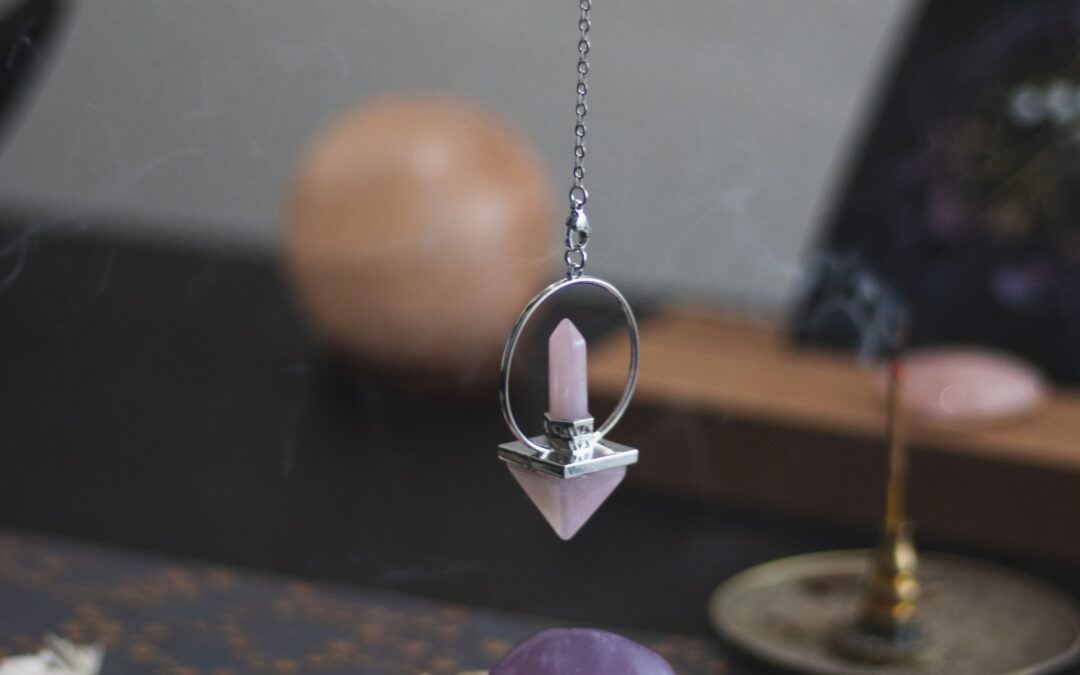
by Michael | Dec 12, 2022 | Blog
Looking back on one of my posts from about a year ago (“Expectations”), I see how accurately I foresaw that this year would go. I advised ignoring fear and pessimism, and encouraged booking those weddings, vow renewals, namings, handfastings, and the like.
In the event, we had no more lockdowns or sudden changes of law, and all has gone pretty smoothly.
Before I claim to be an infallible soothsayer, I have to admit that I didn’t hit the mark with every prediction the previous year! So feel free to take my words with a pinch of the proverbial!
However, encouraged by my recent success, I do suggest the following.
Definitely, go for it. If you want to mark an occasion in a special way. Don’t hold back. Although we don’t know – of course! – what lies round the next corner, there’s no point hesitating from fear or apprehension. As I write, there’s no major threat hanging over us. So, why defer?
If you have the excuse to celebrate, then do so! We haven’t had a lot of joy in the last few years, so let’s make up for it!
Another bonus lies on the horizon. Mind you, this is speculation at present …
You may know that Parliament is currently debating amendments to the marriage laws. What these might mean is that independent celebrants (yes, such as me!) might be able to conduct legally-binding marriages. A decision is unlikely to be reached before July, and then the celebrant will have to be trained and vetted, so it may not happen in 2023. And it’s no forgone conclusion. However, it’s something that can be looked forward to (I just hope it gets passed).
If it happens, it will make the whole registering process so much simpler. You’ll be able to ask me (for example!) to conduct the ceremony of your dreams and also do the legal bits at one and the same time. That may also work out cheaper, but it will certainly be more convenient. Well, let’s see how that pans out.
I predict that it will happen – let’s see if I’m right again!
Photo by Susanna Marsiglia on Unsplash
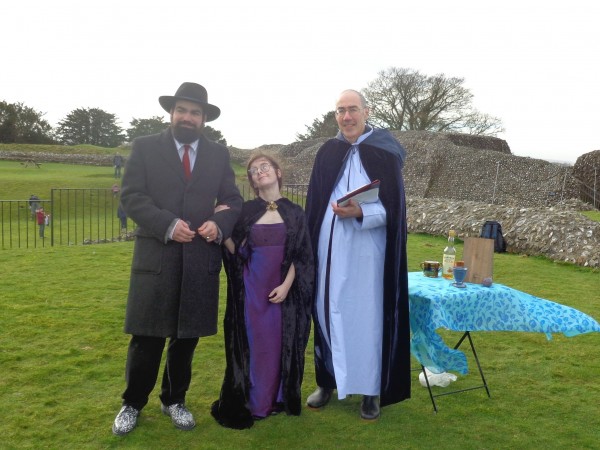
by Michael | Sep 13, 2022 | Blog
As you may be aware, the Law Commission has recently published its recommendations for Weddings. These have gone through to be debated in Parliament. The government will consider the recommendations and prepare legislation, with an interim response produced within six months and the final law within the year.
The Law Society were particularly aiming at two targets with this document. Firstly, to regulate the officiant (rather than the location), and then to agree universal rules for all weddings.
So what is being proposed?
This is only intended to be a resume of the main points, and is subject to my interpretation of the suggestions, so I cannot guarantee accuracy (a fuller report summary can be downloaded here: https://s3-eu-west-2.amazonaws.com/lawcom-prod-storage-11jsxou24uy7q/uploads/2022/07/Weddings-summary-report_.pdf).
Types of Officiant
There will be five types of possible officiant:
- Registration offices
- Anglican clergy (both as at present)
- Nominated officiants (eg religious organisations or Humanists)
- Maritime officiants (conducting civil weddings on cruise ships)
- Independent celebrants
Independent celebrants (the category into which I would fit, of course!) would have to be “fit and proper”, of good character, over the age of 18, with no offences to their name, trained in the legal duties for marriage, and capable of understanding the legal requirements of marriage.
Role
There should be a common set of requirements for all celebrants – mainly, to uphold the dignity and significance of marriage. The legal obligations comprise the three following tasks:
- Ensuring that the couple freely express consent
- Other requirements are fulfilled – eg two witnesses present
- Ensuring that the schedule is signed
Locations
- Any type of location would be possible (not as at present)
- The officiant would have to agree the safety and dignity of the ceremony
Ceremonies
Basically, the same remarks apply to all groups and most weddings.
There would be core requirements (such as expression of consent). Religious content would be allowed in civil weddings, but the ceremony would have to be identifiable as a civil ceremony.
There would be no requirement for open doors.
Conclusion
A lot of consultation and hard thinking has gone into the drafting of these recommendations. I am confident that most will be passed without too much debate. Most of it makes good sense – not least, the underlying implication that the couple can choose the sort of ceremony they want for their big day (which has always been my mantra!).
I am optimistic that the government will be happy to let independent celebrants (not just Humanists, for example) play a legal role in weddings – obviously, under certain restrictions.
I believe that this would be a step forward for the UK, and follow the lead shown by Jersey, as well as Australia, New Zealand and USA.
Watch this space!
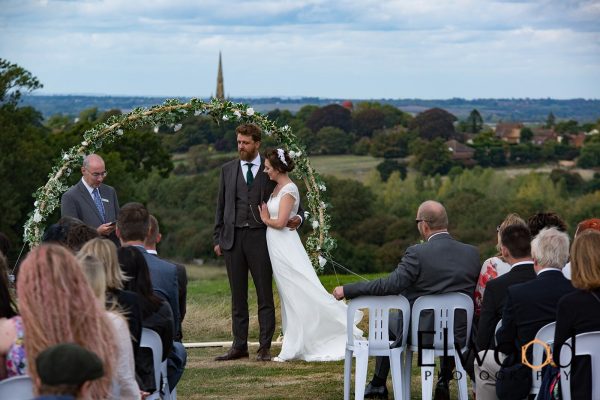
by Michael | Jun 27, 2022 | Blog
With all the (justified!) obsessive talk about inflation, the short piece in Saturday’s “Money” section of the “Daily Telegraph” may have gone unnoticed. However, the report (with statistics furnished by American Express) contains some horrifying revelations about how much wedding costs have risen since pre-COVID.
Apparently, it used to cost guests an average of £391 in 2019 to attend a wedding. (That’s quite surprising in itself!) Now, they say, this figure has risen to £883. And we’re not talking destination weddings!
It appears that, across the population, £15.6 billion is spent on outgoings such as accommodation, clothes, grooming and travel.
We learn that hair and beauty costs have jumped up 41% per wedding. Spending on outfits have gone up by more than a fifth to £159. This had accounted for £130 in 2019. Accommodation costs have gone up 31%.
Costs are always going to rise, of course, but it really makes accepting a wedding invitation something to think carefully about. And we aren’t even taking gifts into account!
I don’t think there is much we can do about it. As far as inflation goes, we mostly have to grin and bear it, so the same must go for wedding guest costs. I can’t wave a magic wand (I wish I could!) and resolve things. Mutual awareness, empathy and understanding are important.
Couples will have to consider the circumstances for their guests and be accepting if their guests have to duck out or can’t afford the Maserati that might be on the Wedding List! Just as guests may have to make a sacrifice or two to attend the wedding, so the couple must make sure (without going to extremes) that they show their appreciation to those guests who add so much to the whole affair.
A wedding is still a wonderful, memorable event (especially, with a great celebrant conducting the ceremony!).
But welcome to the new tomorrow!
Photo: www.elwoodphotography.co.uk
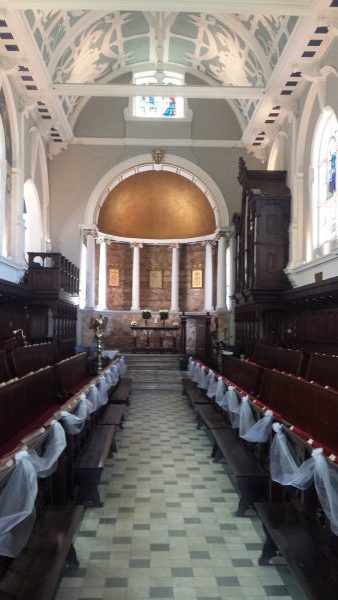
by Michael | Jun 7, 2022 | Blog
Returning to day-to-day affairs seems a little mundane, after the weekend we’ve just had! It’s been even harder for me, as I celebrated my birthday right in the middle of the long weekend. Anyway, I hope you enjoyed the Jubilee (and my birthday!).
A few weeks ago (I’m afraid I got distracted, and put it off!) The Daily Telegraph published an interesting article. Apparently, marriages in places of worship now (as of 2019) account for less than a fifth of all ceremonies. This is the first time such a drop has been recorded – and actually represents a record low.
Religious ceremonies accounted for 18.7% of opposite-sex marriages, and same-sex a mere 0.7%.
One reason suggested was that more couples are choosing to live together, rather than marry, but that doesn’t really explain the drop in the religious option. I wonder if it is more connected with the drop in active church-going.
Incidentally, I wonder if this will get worse before it recovers. Faced with all the uncertainty around Covid and social distancing, people prefer the greater flexibility of a civil celebrant to the rigidity of the Church.
I am not going to knock religious ceremonies (especially as I chose to marry in a full religious ceremony myself!). Obviously, they appeal to those religiously inclined, and can offer a personal, meaningful, spiritual and beautiful ceremony in a special setting.
Drawbacks could be perceived to be that they are rather one-size-fits-all. The basic liturgy is followed, and will be the same – or similar – for each couple. There is little flexibility in readings, texts, ritual etc., whereas a celebrant-led service can provide all these.
There can be complications, such as a mixed-marriage, which is no problem for a civil celebrant, but which may present difficulties for the priest. Moreover, a full-blown religious service can be a bit much for people who are only lukewarm towards religion, as it is.
The Church can be a lovely setting, but a civil venue can be chosen that is equally, or even more, spectacular and atmospheric.
So each to their own, of course. There is plenty to be said for religious weddings, but they are not everybody’s cup of tea. A personalised celebrant-led ceremony may well tick all the boxes.
To find out how, a chat with me may be all that you need!
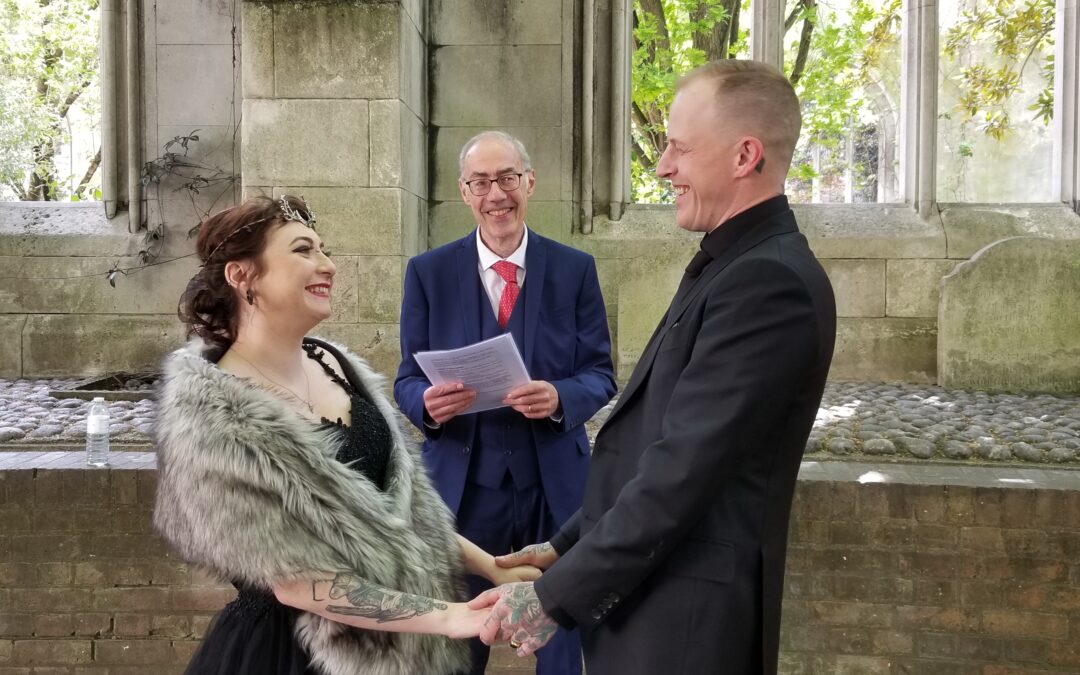
by Michael | May 10, 2022 | Blog
When I performed my first elopement ceremony recently, a number of people were curious. Did this take place in secret? Were there elements that you wouldn’t have expected in a “normal” ceremony?
The circumstances were as follows: Anita and Bruce (not real names!) simply did not want razzamatazz. They definitely dreaded being the centre of attention. They got married officially in the States, where they live, but booked a photographer and myself to conduct what was to be the “real” wedding in London (where nobody else could follow them!).
They wanted a part-religious (spiritual rather than conventional) ceremony, so a celebrant made sense.
We all dressed up (I was a little more conventional!), as the photo shows.
Unusually for London, the weather played along, and it was a beautiful day. Also, the venue was very atmospheric: the lovely ruins of St Dunstans-in-the-East, near Tower Bridge.
The service had been agreed over the months and consisted of the following:
After a short introduction, I read a poem called “Why marriage?”, which seemed appropriate!
I then gave an address about the significance of marriage (not too heavy, though!) before moving on to the Exchange of Vows. Anita and Bruce chose to recite traditional vows, but also wrote their own. After agreeing the basics, they had composed their vows independently, and this was the first time either of them had heard what the other had prepared.
It was predictably moving and very beautiful.
Anita had written more of an essay (!), but what was clear – if it hadn’t already been – was that they were deeply in love and were absolutely serious about their relationship.
We then heard a poem “The Meaning” by Kellie Spehn before moving on to a Handfasting, preceded by an explanation of the ritual. The couple were bound together for a minute or so in an infinity knot.
Then it was time for the ring exchange before we concluded with the Blessings of Divine Qualities and the pronouncement allowing a kiss! (This was certainly the longest I have witnessed!
A round of applause from some (distant) onlookers followed, and we were done!
After a week in London, our couple returned to the States, to commemorate the event with a couple of (small!) receptions.
Their testimonial was heart-warming (“magnificent!”) and made me proud to have been part of such a joyous but significant occasion.





